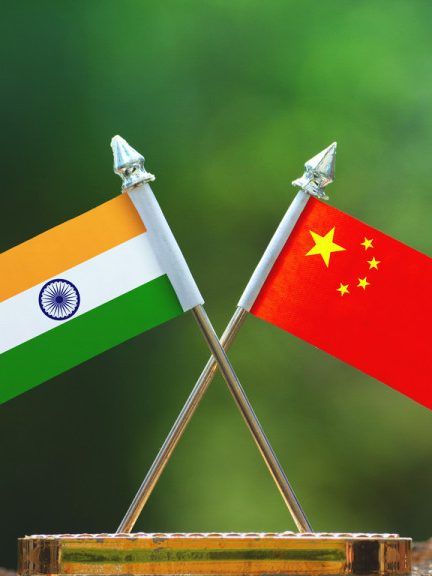China Announces Visa Fee Waiver for Nepalese Citizens
China has announced a visa fee waiver for Nepalese citizens starting from May 1, 2024. The Embassy of China in Kathmandu has decided to waive visa fees for regular applications for Nepali citizens seeking to travel to China. Ambassador of China to Nepal, Chen Song, stated that this decision was taken to promote the relationship between the two countries and enhance service convenience. Nepal already exempts Chinese citizens from visa fees during recent visits by the Deputy Prime Minister and Foreign Minister of Nepal. This news marks a significant step in enhancing bilateral relations and facilitating travel between Nepal and China.
But what could be the reasons why China is becoming more flexible towards its small neighbour, Nepal? In past years, China has had problems with several countries, including Pakistan, Sri Lanka, Maldives, and Taiwan. Then why and how China is becoming open towards Nepalese?

While there are different angles to watch out for in; this historical moment between two countries, from a tourism perspective, this is great, as by eliminating visa fees for Nepali citizens, the Embassy of China in Kathmandu has opened doors for increased tourism, business exchanges, and educational opportunities. With this gesture, both nations are fostering closer ties and promoting mutual cooperation.

One significant reason could be labour exchange; China’s economy has grown substantially, leading to increased labour costs. Consequently, many multinational companies are seeking alternatives. China’s economy is primarily based on labour-intensive manufacturing and production. Agriculture in China accounts for less than 15% of its economy, primarily in the eastern and south-eastern regions, which are also the most populated areas. This indicates a clear sign that China is in danger of sustaining its economy as its population demands higher wages, and younger generations have different work mentalities. Additionally, China’s previous One Child Policy may have impacted population growth, which has now been relaxed to allow up to three children. Therefore, for China, opening borders to labour-producing countries like Nepal is crucial. Developed countries like Canada, USA, UK, and Germany are increasingly focusing on people-driven economies, irrespective of race or ethnicity, emphasising the importance of sustaining the economy.
Another potential reason could be India. India’s exponential economic growth has garnered praise worldwide. India shares a border of over 3,488 kilometres with China, divided into three sectors: the Western Sector (Ladakh), the Middle Sector (Himachal Pradesh and Uttarakhand), and the Eastern Sector (Sikkim and Arunachal Pradesh). Unlike China, India has a young population engaged in agriculture, with over 80% of the land suitable for agriculture. India is self-sufficient in various sectors, including agriculture, manufacturing, production, and development. Historically, before the 17th century, the Indian subcontinent was one of the wealthiest regions globally, with significant advancements in various fields. India is experiencing a resurgence of its Golden Era, open-handedly welcoming everyone.

Other Southeast Asian countries are also experiencing rapid growth, while Europe seems to be regressing. This shift towards Asia has prompted China, with its massive population, to prepare for emerging global market trends. While the USA was once the driver and China the rolling wheel, other countries are now developing their own roads. Consumer behaviour has also changed after COVID, further influencing market dynamics.

How does this affect tourism? For Nepalese tourism, improved bilateral relations benefit both countries. Even if only 1% of Chinese tourists visit Nepal, the economy could experience a significant boom. Nepal must be prepared to handle both Chinese and Indian tourists, reminiscent of its golden era as a trading hub between India and China. Nepal should create a favourable tourism environment, catering to the interests of both Chinese and Indian tourists.

Other reasons for China waiving free visas for Nepalese citizens could be influenced by various factors, including diplomatic, economic, and strategic considerations:
Diplomatic Relations: Offering free visas could strengthen diplomatic relations between China and Nepal, fostering closer ties and cooperation.
Economic Cooperation: China might see Nepal as a potential economic partner, facilitating easier travel for Nepalese citizens to promote trade, investment, and tourism.
Strategic Interests: China could have strategic interests in Nepal, such as geopolitical influence or access to natural resources.
Regional Stability: Strengthening ties with Nepal could contribute to stability in the South Asian region.
Counterbalance Influence: China’s decision could be influenced by efforts to counterbalance the influence of other countries in the region, such as India.
People-to-People Exchange: Facilitating travel could enhance cultural understanding and cooperation between China and Nepal, fostering greater societal connections.
Overall, China’s decision to waive free visas for Nepalese citizens likely stems from a combination of political, economic, and strategic considerations aimed at strengthening bilateral relations and advancing China’s interests in the region.
Our Latest Posts
View All
Scope of Regenerative Tourism in Nepal
if we wish to give back at-least in part to Nature from where we have mindlessly taken, by means of ‘regeneration’, the only way to […]
Read More
















